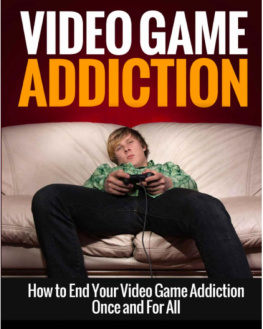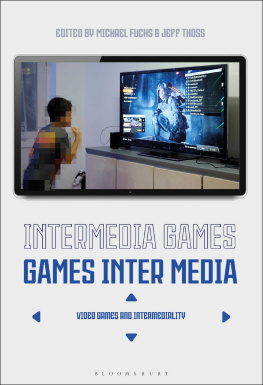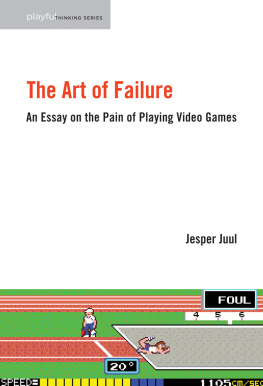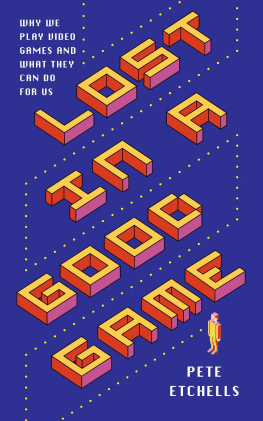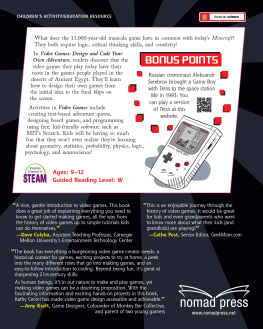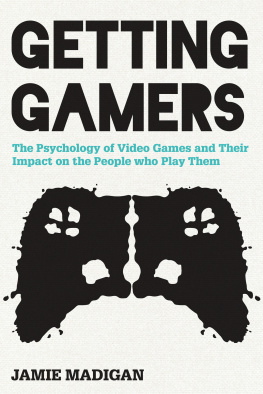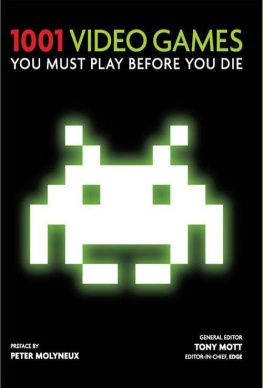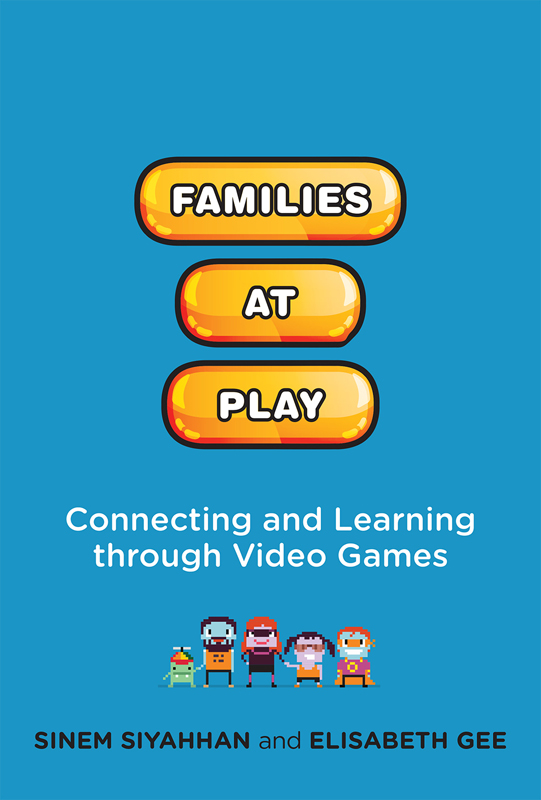Contents
Guide
Pagebreaks of the print version
The John D. and Catherine T. MacArthur Foundation Series on Digital Media and Learning
Civic Life Online: Learning How Digital Media Can Engage Youth, edited by W. Lance Bennett
Digital Media, Youth, and Credibility, edited by Miriam J. Metzger and Andrew J. Flanagin
Digital Youth, Innovation, and the Unexpected, edited by Tara McPherson
The Ecology of Games: Connecting Youth, Games, and Learning, edited by Katie Salen
Learning Race and Ethnicity: Youth and Digital Media, edited by Anna Everett
Youth, Identity, and Digital Media, edited by David Buckingham
Engineering Play: A Cultural History of Childrens Software by Mizuko Ito
Hanging Out, Messing Around, and Geeking Out: Kids Living and Learning with New Media by Mizuko Ito et al.
The Civic Web: Young People, the Internet, and Civic Participation by Shakuntala Banaji and David Buckingham
Connected Play: Tweens in a Virtual World by Yasmin B. Kafai and Deborah A. Fields
The Digital Youth Network: Cultivating Digital Media Citizenship in Urban Communities edited by Brigid Barron, Kimberley Gomez, Nichole Pinkard, and Caitlin K. Martin
The Interconnections Collection developed by Kylie Peppler, Melissa Gresalfi, Katie Salen Tekinba, and Rafi Santo
Gaming the System: Designing with Gamestar Mechanic by Katie Salen Tekinba, Melissa Gresalfi, Kylie Peppler, and Rafi Santo
Script Changers: Digital Storytelling with Scratch by Kylie Peppler, Rafi Santo, Melissa Gresalfi, and Katie Salen Tekinba
Short Circuits: Crafting e-Puppets with DIY Electronics by Kylie Peppler, Katie Salen Tekinba, Melissa Gresalfi, and Rafi Santo
Soft Circuits: Crafting e-Fashion with DIY Electronics by Kylie Peppler, Melissa Gresalfi, Katie Salen Tekinba, and Rafi Santo
Connected Code: Why Children Need to Learn Programming by Yasmin B. Kafai and Quinn Burke
Disconnected: Youth, New Media, and the Ethics Gap by Carrie James
Education and Social Media: Toward a Digital Future edited by Christine Greenhow, Julia Sonnevend, and Colin Agur
Framing Internet Safety: The Governance of Youth Online by Nathan W. Fisk
Connected Gaming: What Making Video Games Can Teach Us about Learning and Literacy by Yasmin B. Kafai and Quinn Burke
Giving Voice: Mobile Communication, Disability, and Inequality by Meryl Alper
Worried About the Wrong Things: Youth, Risk, and Opportunity in the Digital World by Jacqueline Ryan Vickery
Good Reception: Teens, Teachers, and Mobile Media in a Los Angeles High School by Antero Garcia
Families at Play: Connecting and Learning through Video Games by Sinem Siyahhan and Elisabeth Gee
Families at Play
Connecting and Learning through Video Games
Sinem Siyahhan and Elisabeth Gee
The MIT Press
Cambridge, Massachusetts
London, England
2018 Massachusetts Institute of Technology
All rights reserved. No part of this book may be reproduced in any form by any electronic or mechanical means (including photocopying, recording, or information storage and retrieval) without permission in writing from the publisher.
This book was set in Sabon by Westchester Publishing Services. Printed and bound in the United States of America.
Library of Congress Cataloging-in-Publication Data
Names: Siyahhan, Sinem, author. | Gee, Elisabeth, author.
Title: Families at play : connecting and learning through video games / Sinem Siyahhan and Elisabeth Gee.
Other titles: Play 2 Connect | Play to Connect
Description: Cambridge, MA : The MIT Press, 2018. | Series: The John D. and Catherine T. MacArthur Foundation series on digital media and learning | Includes bibliographical references and index.
Identifiers: LCCN 2017024949 | ISBN 9780262037464 (hardcover : alk. paper)
Subjects: LCSH: Video games--Social aspects. | Family recreation. | Communication in families. | Intergenerational communication.
Classification: LCC GV1469.34.S52 S59 2018 | DDC 794.8--dc23 LC record available at https://lccn.loc.gov/2017024949
To our mothers
Contents
- List of Illustrations
- People using media on the train
- The Livingstone family playing Halo together
- Hector Gastelum and his sons playing games
- Luca and Gabe playing Civilization on the computer
- Play sitting in between reality and fantasy
- Learning around games across contexts
Series Foreword
The John D. and Catherine T. MacArthur Foundation Reports on Digital Media and Learning, published by the MIT Press in collaboration with the Monterey Institute for Technology and Education (MITE), present findings from current research on how young people learn, play, socialize, and participate in civic life. The Reports result from research projects funded by the MacArthur Foundation as part of its $50 million initiative in digital media and learning. They are published openly online (as well as in print) in order to support broad dissemination and to stimulate further research in the field.
Preface
Although most video gaming takes place at home, family learning and communication around video games, for the most part, has been ignored in education and communication research. At the same time, despite being increasingly accepted as a context for teaching and learning, video games continue to be a source of skepticism and concern among many parents due in part to the negative portrayal of video games in mainstream media. This book is an attempt to broaden the conversation and discourse around video games by focusing on what this medium could do for families.
Although I played video games while growing up, it wasnt until the first year of my doctoral program, where I studied family learning in the context of museums, that I discovered video gaming as a means to support families. A serendipitous observation of rich conversations among parents and their six-year-olds around a glass-blowing simulation game at an exhibit gave me the idea to design video games for families and planted the seed for this book.
I am indebted to Michael Downton, a fellow graduate student, for helping me run the first Family Quest after-school program for families in the fall of 2007. As part of this program, families played through different educational games using Quest Atlantis, a three-dimensional, multiplayer online teaching and learning platform. I spent the next three years growing Family Quest from an after-school program into a stand-alone virtual world within Quest Atlantis where families played the games I developed. My advisers, Joyce Alexander and Sasha Barab, should be recognized for providing guidance and encouragement to pursue an area of research outside of the traditional boundaries of the learning sciences. Many ideas and some of the work presented in this book are drawn from my dissertation work, which was supported by a fellowship I received from Indiana University.
Elisabeth and I met while I was a faculty member and fellow at the Center for Games and Impact at Arizona State University (ASU). Through our collaboration, we were able to expand the research on families and video games in new and exciting ways. A grant from the Joan Ganz Cooney Center at Sesame Workshop and the Heising-Simons Foundation allowed us to document how families with diverse backgrounds engage in intergenerational play around video games in the context of their homes. Chapter 2 of this book focuses primarily on the findings of this work.


